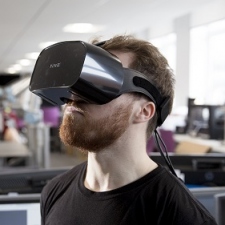A Nottingham Trent University MSc Medical Product Design student is developing software to allow people to confront social anxieties in a virtual environment. The technology provides exposure therapy for simulated situations which trigger anxiety. By repeated exposure to such situations, a person can overcome their fear to better prepare themselves for anxiety-provoking real-life situations.
Gareth Walkom has designed a system that includes advanced eye tracking technology within a VR headset and features a range of scenarios and provides feedback on a user’s anxiety levels, showing progress and indicating ways to improve.
Gaining Exposure
More than 70 million people worldwide have a stutter - equal to one per cent of the global population - according to The Stuttering Foundation. Tests undertaken with a stutter self-help group showed that participants’ anxiety levels decreased over repeated sessions after using Gareth’s software. Participants also showed improvement concerning their speech.
“I know first-hand how much impact a stutter can have on a person’s life, so I wanted to do something that has the potential to make a huge difference in the lives of other people who stutter,” said Gareth. “For a person who stutters, talking in front of an audience, for instance, can be an intimidating and heart-raising task. But with the growing availability of virtual reality technology, people could practice exposure therapy in ways previously unavailable to them from the comfort of their own home.”
Gaze Behaviour
The technology would also provide feedback on the wearer’s eye activity, as gaze behaviour plays an important part in stuttering therapy. “When someone stutters, they can also involuntarily look away from the person they’re speaking to and their eyelids may close or flicker,” said Gareth. “So it’s important to use headsets which track where the person looks during social interactions and whether they look at the person’s face in order to improve their gaze.”
Heal The World
Professor Philip Breedon, leader of Nottingham Trent University’s Design for Health and Wellbeing Research Group, who supervised the study, said: “Gareth has taken a subject matter which is personal to him and delivered a research project which has the potential to change people’s lives. By utilising the growth in virtual reality technology, his research has the potential to help people who experience a whole range of social anxieties, including those who stutter.
“It’s a fantastic example of how design, combined with advanced technologies, has the potential to improve the health and wellbeing of millions of people around the globe.”













